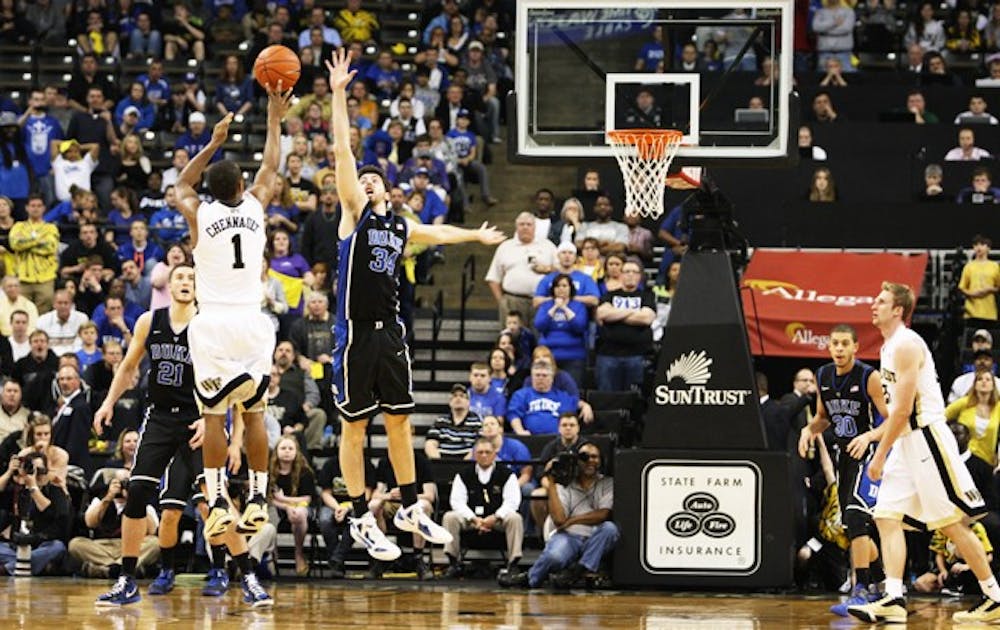I came to my first Chronicle sports meeting hoping for an outlet to publish my musings as an ardent Blue Devil fan.
I wanted to contribute to The Chronicle’s sports blog, and I wanted to write about the basketball team’s jerseys.
Specifically, I wanted to write about the fact that four of the men’s basketball team’s five losses in the 2010 season came when they wore the black jerseys, while only one came while the team was wearing blue jerseys. The story, as I envisioned it, would address the question, “are the black jerseys somehow unlucky?”
Gabe Starosta, the editor of the section at the time, told me I could not make that my first byline, even if it were only a blog post. “If that’s the first thing you write about,” he said, “then no one will ever take you seriously again. You need to establish credibility first.” I grudgingly agreed to take on other stories first, pledging to eventually write a column calling for the team to eliminate the alternate jerseys.
Thankfully, while I was ‘building credibility’ by writing other stories, I came to realize that the premise behind my initial article was what we now refer to as a “clown question.” Obviously, Gabe knew that would happen, and I’m glad he did.
It might seem like the preceding anecdote was a 200-word excuse to make a joke about clown questions, but I assure you there’s more to it than that. Asking questions is the most important—and most difficult—part of being a journalist by far.
Although there’s a lot to be said for being a good writer, the skill is highly overrated if unaccompanied by the ability to ask good questions. There are already computer programs that can pump out a game recap if given quotes and statistics, and there are a whole lot of folks who can piece together a few active sentences.
The process of asking questions is multi-faceted. A good reporter must ask the right questions, phrase their questions well and have the courage to actually ask them.
As with many things in life, preparation is crucial to the first element of asking a good question. Particularly when writing previews, I learned that I should always get a sense of the team Duke would be playing before I began. In the real world, I’ll take that mindset with me.
In some ways, though, the way a question is phrased is more important than its content. Asking questions that imply an answer, while convenient at times, often prevents the interviewee from giving a fuller, more interesting story. Instead, I saw that the best reporters asked broader questions and actively listened to the answers, following up on interesting angles. In any walk of life, I expect that the most successful people ask questions that allow the respondent to provide insight, probing for more interesting information. It’s easy to get caught up in “coach-speak” but essential not to.
For me, though, mustering the courage to ask tough questions was always the most difficult part of being a journalist. I found this difficult for several reasons. First and foremost, I was often in awe of the athlete or coach I was speaking to, particularly on the occasions I got to speak with those in the revenue sports.
In my first experiences covering basketball and football, I was in awe of the players I spoke with—it’s weird to wear someone’s jersey one day and ask him questions the next. But I eventually realized that while the individual I was speaking with might have graced ESPN’s front page, he was also a classmate and a regular person. That even goes for Coach K, who has no qualms with playfully teasing reporters.
That’s something I’ll always carry with me as I enter the business world. After talking to the greatest basketball coach of all time—even as one of many reporters in a press conference—there is no reason to be intimidated by anyone else.
There are a lot of wonderful things I can take from my experience at The Chronicle—amazing memories of events I’ve been privileged to cover, and friendships I look forward to maintaining the rest of my life—but I think that the ability to ask solid questions may be the greatest life skill I take from my time at the paper.
Jacob Levitt is a Trinity senior. He has been an associate editor for the sports section for three years and a football beat writer.
Get The Chronicle straight to your inbox
Signup for our weekly newsletter. Cancel at any time.

